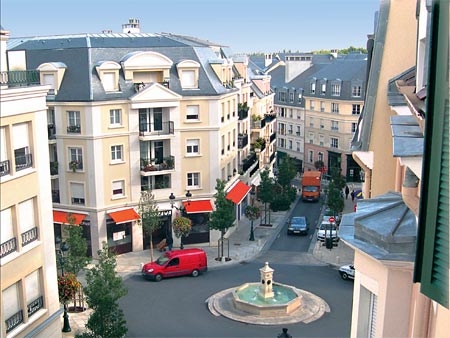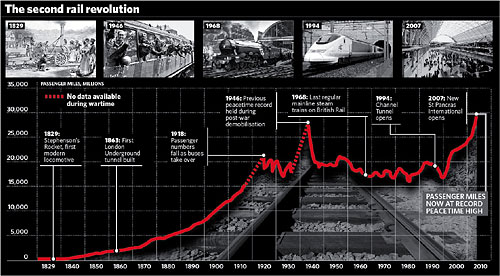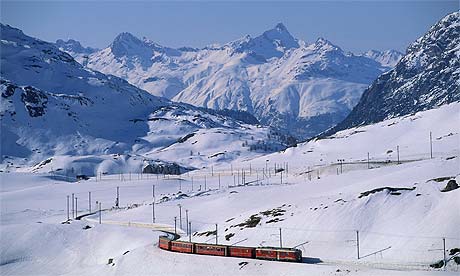By Foot Or By Rail
Posted by Big Gav in europe, rail transport, transport, walkable cities
Laurence at PedShed has a post on a European prize for "best urban neighborhood built in Europe in the last 25 years" - Three Prix Rotthier Winners.
The winners of the Prix Rotthier pour la Reconstruction de La Ville 2008 have been announced, and they are gems. The Prix Rotthier prizes are given once each three years, and the theme of this year’s competition was “the best urban neighborhood built in Europe in the last 25 years.”
Not only are the winners beautiful and functional, they were judged to have been conceived and designed according to many of the principles of sustainable development and the EU Green Paper for the Urban Environment. These include revitalization of existing cities and suburbs with compact, mixed use development; integrating land use and transportation for more walking, biking, public transit and fewer motor vehicles; harmonious small and medium industry; energy efficiency and green building; waste reduction and recycling; parkland and integrated soil and water management; and not least, to “defend the architectural heritage against the uniform banality of the international style, respecting rather than imitating the old.”
The competition has done a service by providing tearsheets with site plans, photos and statistics on each of the ten winners. However, descriptive material is lacking (until the catalog is published in late 2008), so this post will give capsule descriptions of three neighborhood-scale projects, along with links to more information.
Pedshed also has a (slightly older) post noting British Train Ridership Hits Peacetime Record.
A story about record train ridership in the UK includes this impressive graphic. The chart is based on the Association of Train Operating Companies (Atoc) booklet The Billion Passenger Railway. The booklet features several articles — including one that forecasts that the competitiveness of 21st century cities will depend on their high speed rail links.
Andrew Curry reports from September 2083:With the internet long hamstrung by crime and fraud, and air travel the preserve of the hyper-rich, the cities which keep their place at the table are those which have solved four problems, according to Vienna Mayor, Kristal Stangl, the host of this year’s event.
“We must make sure that our cities have enough energy to function, to be sure, and that resources like water are secure. There must be enough food. They need to be good places to live. A lot of cities can make these things happen, even in our present conditions of scarcity. But the economic part is about getting the best brains to work on the complex problems which need to be solved to build new knowledge and value. That needs good transport links, and the cities which invested in high speed rail in the first part of the century are the best placed to compete.”
Some cities have slipped off the map as the European periphery has grown and the core shrunk. Most of the ‘Euro-30′ come from the ‘Golden Diamond’ between London, Hamburg, Krakow, and Marseilles. Some long-standing rivalries have been settled; Madrid is no longer a member, while Barcelona holds on to its Convention status. Rome plays second fiddle to Milan. Manchester’s high speed link to the tunnel has helped it stay in the club, while Glasgow’s failure to gain one has exiled it to the fringes.
The Guardian reports that Europe's rail renaissance is on track as well.
The rail renaissance in Europe is racing ahead like a 320kph TGV yet Guillaume Pepy, head of SNCF, sees risks as well as opportunities as he celebrates the centenary of the reborn Mont Blanc Express aboard one of its six new electric traction trains.
Last weekend saw the start of the French summer holiday season and 1.3 million people thronged Paris's stations as they headed for the mountains and sea. The elongated twin-set TGVs pulling out of the Gare de Lyon virtually every five minutes are packed with up to 1,000 passengers. The concourse and platforms are so crammed with anxious families and international backpackers it's surprising they all get on board on time.
Even in the driving rain sweeping through the French Alps, accompanied by thunder and lightning, drenched walkers and climbers rush to join the "express" linking St Gervais with Vallorcine on the Franco-Swiss border and offering stunning views of the Mer de Glace.
Pepy, SNCF chairman and chief executive (PDG) since February, says that, unlike his predecessors who had to manage a railway recession, he is presiding over an accelerating boom. The state-owned SNCF delivered a net €1.1bn (£875m) profit last year and first-half figures, due next week, are said to be sparkling. Pepy envisages up to 80m extra passenger trips this year or an increase of around 8%.
"This change will speed up because we are facing a twin energy and environment crisis," he says, pointing to surging fuel costs and growing personal worries about carbon footprints. "People want sustainable mobility and, in France, more trains and more SNCF."
Carlos Ghosn, head of Renault-Nissan, he adds, has spoken of the demise of the petrol-driven car and drivers are shifting to trains which are four times more energy-efficient than cars – and six times more than planes. "People are looking for new answers," Pepy says. "They are waiting for SNCF solutions."
The Times notes that air traffic's loss is rail's gain - High-speed trains seize short-haul market as fuel cost cripples the airlines.
The airline industry has been crushed by the price of kerosene and deserted by passengers fed up with delays. After decades of disappointment, false dawns and virtually bankrupt Channel Tunnels, we have finally arrived at the age of the train and the evidence is in the crowd at St Pancras.
Only eight months after opening its doors in November, the new station is choc-a-bloc at peak hours, an exciting but slightly nerve-wracking development for Eurostar and its biggest shareholder, SNCF, the French state railway.
Traffic growth on Eurostar is accelerating like an Alstom locomotive, increasing by 21 per cent in the first quarter, compared with the same period in 2007, and revenues are up by a quarter. Those figures were no flash in the pan, a boost from all the hooplah at last year's opening of St Pancras. Traffic in the second quarter has grown at similar rates, insiders say.
It would not be unfair to say that squeezing the London-Paris journey time by just 20 minutes has boosted Eurostar's income by 25 per cent.
While Eurostar thunders through Kent, the competing service to Paris and Brussels is lost on a never-ending building site west of London. The Terminal 5 fiasco has not helped British Airways's short-haul European business, but by next year (assuming no new operational disaster) it should have ironed out the wrinkles.
Then, BA is left with the awful question of whether short-haul air traffic has any future in Europe. The answer has to be a resounding “no”.
When did you last hear of a service business where the fuel bill represented more than a third of the operating cost, substantially higher than the cost of the staff?








